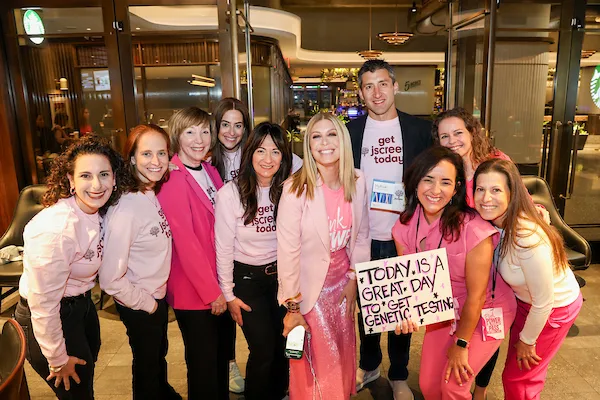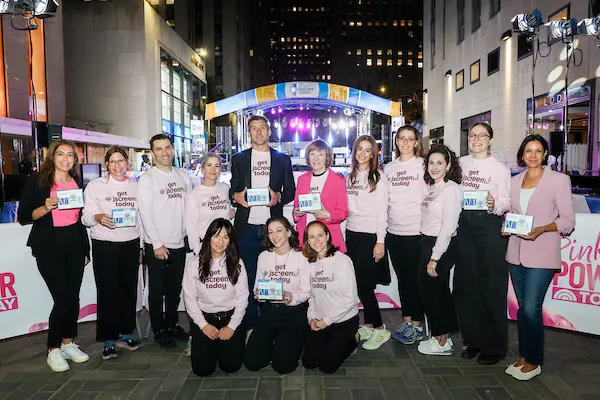JScreen: Empowering Health, Preventing Disease, and Thriving as a Community

jscreen group photo of people wearing pink and holding a sign saying “Today is a great day to get genetic testing.”
What began as a visionary idea at Emory University’s Department of Human Genetics has become a national movement for proactive, preventative health care. jscreen, a proud partner of Jewish Federation of Greater Atlanta, started as a small team with a big mission: to prevent genetic diseases and hereditary cancers through accessible, at-home screening.
Founded by Karen Grinzaid, jscreen emerged from her work as a genetic counselor at Emory, where she found herself too often delivering devastating news to families. Determined to change that narrative, she helped pioneer an at-home testing model—long before the COVID-era made such services commonplace. “People thought she was crazy,” recalls Orit Reisman Berliner, jscreen’s Marketing Manager for Outreach and Operations. “No one trusted the idea of getting genetic results outside a doctor’s office. But Karen was looking into the future.”
Today, jscreen’s programs are anything but futuristic—they’re saving lives right now. The organization offers two separate at-home screening kits: carrier screening, which tests for over 250 genetic diseases (including Tay-Sachs, Canavan, and Gaucher diseases), and hereditary cancer screening, which assesses risk for 11 types of cancer by identifying mutations in more than 40 cancer genes.
jscreen CEO, Dr. Matthew Goldstein says constantly improving technologies allow them to continue to grow: “Rapid advancements in medical technology directly benefit genetic screening programs like jscreen. These innovations enable faster, more comprehensive testing, personalized health insights, and greater access to preventive care.”
These home-testing kits are offered year-round, but each October the work takes on special meaning with Breast Cancer Awareness Month. Their hereditary cancer screening includes BRCA1 and BRCA2 mutations—gene variants linked to elevated risks for breast, ovarian, prostate and pancreatic cancers, which are particularly prevalent in the Ashkenazi Jewish population. For many, this kind of testing can mean the difference between prevention or early intervention and late discovery.
From its early days as a six-person operation to today’s 20-member team, jscreen’s reach has multiplied. Their recent live appearance on the Today Show, with Robin Roth of Boobie Docs and Dr. Eleonora Teplinsky, marked a milestone moment of national visibility. “We registered almost 300 people for hereditary cancer testing right there on the plaza,” Orit says. “Since then, a hundred more have signed up online.” The event featured survivors like Sheryl Crow and Jill Martin, celebrating prevention and empowerment rather than fear.
The Today Show appearance was followed by an article in People Magazine, amplifying jscreen’s mission even further. Locally, they continue to collaborate with partners such as Sharsheret, the Jewish Fertility Foundation, and other Federation-supported organizations to bring education and testing to the community.
Matt says, “Our partnership with Federation allows us to expand our outreach efforts within the Jewish Atlanta community, enabling us to educate, engage and empower individuals with the information they need to plan for healthy futures. Our efforts reinforce the connection between Jewish identity, health, and collective strength and help ensure that our community continues to thrive for generations to come.”
And jscreen continues to grow with plans to expand into new screening areas—like cardiac conditions—and to deepen its outreach nationally, especially among young adults and families preparing for children. “Knowledge is power,” Orit says, “and we want people to use it to live long, healthy lives.”
jscreen will host a special event on November 4 at 7 p.m., featuring CEO Dr. Matt Goldstein, Executive Director Karen Grinzaid, Maternal-Fetal medicine Specialist Dr. Rachel Shulman, and moderator Elana Frank of the Jewish Fertility Foundation. The evening will include discussion on genetics, prevention, and Jewish health.

jscreen group photo, participants wear pink